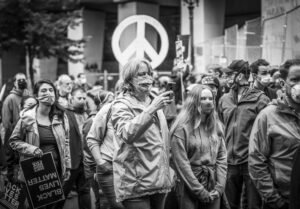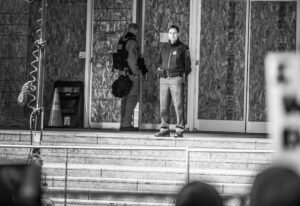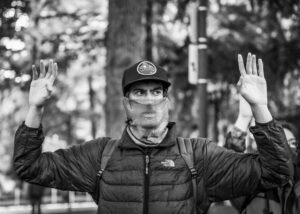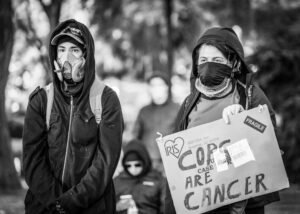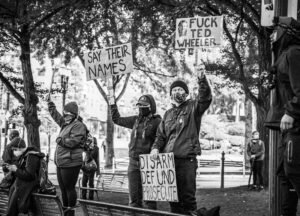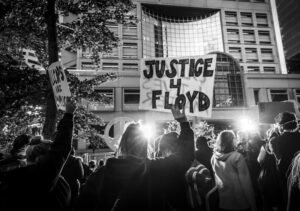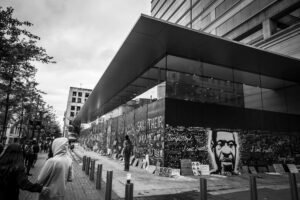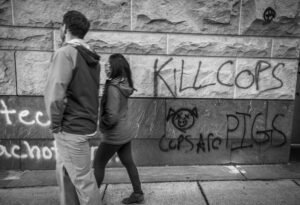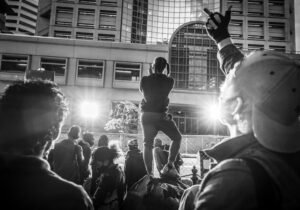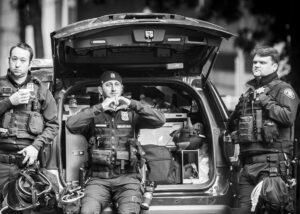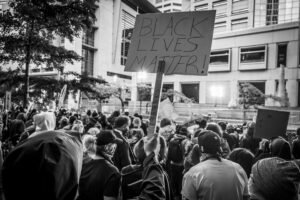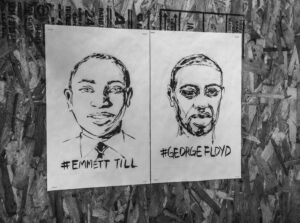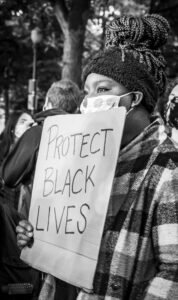Portland Police Chief Steps Down, Mayor Promises Bold Reforms as Protestors Call for Defunding
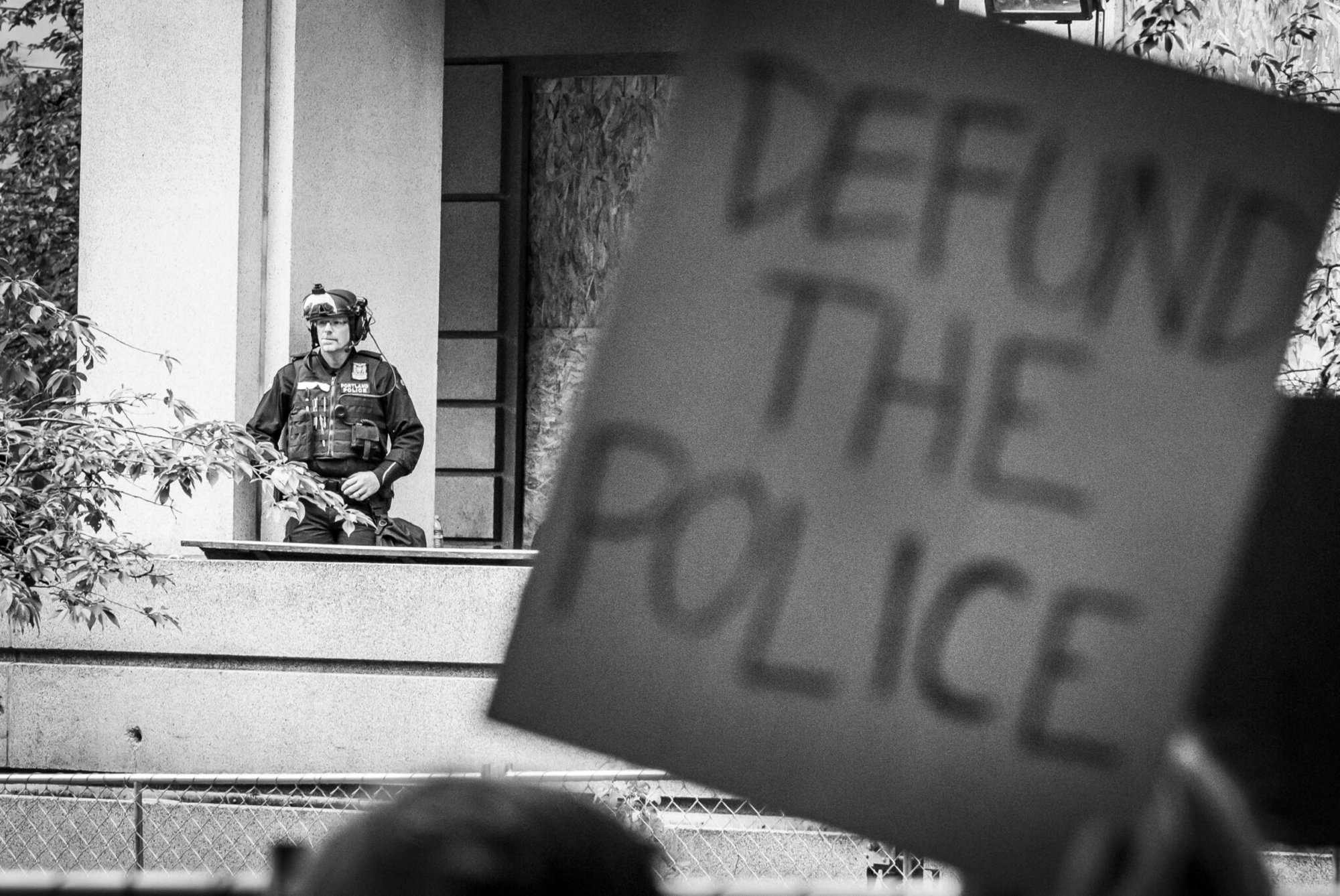
A protester held a’s Photo by Ethan E. Rocke
For the 11th day in a row, protestors took to the streets Sunday in Portland, Oregon, demonstrating against police brutality and demanding criminal justice reforms.
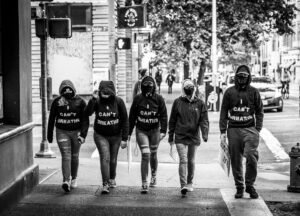
Hundreds of protestors — most of them white — gathered outside the Multnomah County Justice Center downtown to sing, pray, and chant. The protest remained peaceful, but anti-police sentiment was high.
When Multnomah County Sheriff Mike Reese approached the chain-link barrier keeping the demonstrators away from the Justice Center, protestors booed and chanted, “Quit your job!”
Reese approached the barrier as a show of good faith, reaching over to shake hands with members of a group calling itself the Portland Interfaith Clergy Resistance, who often led the demonstrators with hymns, prayers, and chants.
“We don’t negotiate with terrorists!” yelled one protestor, discouraging cooperation with the gesture. “Fuck this hippie bullshit! Don’t give them a photo op!”
“If you really loved us, you wouldn’t tear gas us,” cried another protestor.
Portland police have been heavily criticized for using CS gas and less-lethal munitions to disburse protestors, looters, and rioters in the early days of the protests when the city suffered widespread destruction of property and businesses.
In the wake of the criticisms, Portland Mayor Ted Wheeler, who also serves as police commissioner, directed police to only use CS gas if “there is a serious and immediate threat to life safety, and there is no other viable alternative for dispersal.”
“Imagine if we stopped spending all this money on all this riot gear, on all these rubber bullets, on this tear gas,” said a young black man through a megaphone after Reese made his exit. “Imagine if we spent it on these communities — if we empowered and uplifted the black community.”
On May 29, protesters smashed in the Justice Center’s windows and set fires in cubicles. Authorities have since erected a chain-link perimeter and boarded up windows. Many downtown businesses have boarded up their facades to prevent further damage. The Apple Store in Portland’s Pioneer Square, which was vandalized and looted, is now surrounded by a wooden barrier that has become a massive shrine to George Floyd and the Black Lives Matter movement.
Anti-police graffiti is tagged all over the downtown area. One block from the Justice Center on the north wall of the U.S. District Courthouse, someone spray-painted the words, “Make cops pay in blood.” Beneath the message appeared, “Kill cops.” Myriad anti-police messages were tagged all over the building, including ACAB — shorthand for “All cops are bastards.” The slogan, derived from skinhead subculture, is a popular refrain at Portland protests.
Portland — known for its progressive culture and politics — has a strong tradition of political activism and protest movements. In recent years, it has become an epicenter for often violent clashes between far-right activists and self-described anti-fascists, or Antifa.
Portland’s protestors have joined Minneapolis and many other cities in calling for the defunding of police.
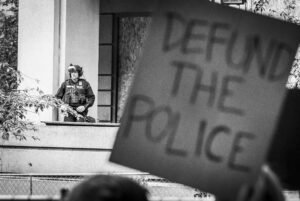
“We need to defund the police, and we need to send all the funds that are paying for your paychecks and your gear to intimidate the black community to empower them instead,” said the young black man with the megaphone to police at the Justice Center. “We live in a society where the justice system profits off of mass incarceration of our black brothers and sisters. I hope y’all understand that y’all are gonna be on the wrong side of history. We will have justice. We will have peace.”
The next day, Portland Police Chief Jami Resch, who had been on the job less than six months, stepped down and announced that she had asked Lieutenant Chuck Lovell to replace her. Lovell is a black man.
Wheeler promised on Monday that the city will implement “meaningful and bold reforms” at PPB.
“With the murder of George Floyd and the many others that were lost prior, including locally, we must reimagine, reform, and rebuild what public safety looks like, and we must go through this process together,” he said.
Wheeler said he intends to announce a “large list of reforms” today.

Ethan E. Rocke is a contributor and former senior editor for Coffee or Die Magazine, a New York Times bestselling author, and award-winning photographer and filmmaker. He is a veteran of the US Army and Marine Corps. His work has been published in Maxim Magazine, American Legion Magazine, and many others. He is co-author of The Last Punisher: A SEAL Team THREE Sniper’s True Account of the Battle of Ramadi.
BRCC and Bad Moon Print Press team up for an exclusive, limited-edition T-shirt design!
BRCC partners with Team Room Design for an exclusive T-shirt release!
Thirty Seconds Out has partnered with BRCC for an exclusive shirt design invoking the God of Winter.
Lucas O'Hara of Grizzly Forge has teamed up with BRCC for a badass, exclusive Shirt Club T-shirt design featuring his most popular knife and tiomahawk.
Coffee or Die sits down with one of the graphic designers behind Black Rifle Coffee's signature look and vibe.
Biden will award the Medal of Honor to a Vietnam War Army helicopter pilot who risked his life to save a reconnaissance team from almost certain death.
Ever wonder how much Jack Mandaville would f*ck sh*t up if he went back in time? The American Revolution didn't even see him coming.
A nearly 200-year-old West Point time capsule that at first appeared to yield little more than dust contains hidden treasure, the US Military Academy said.

